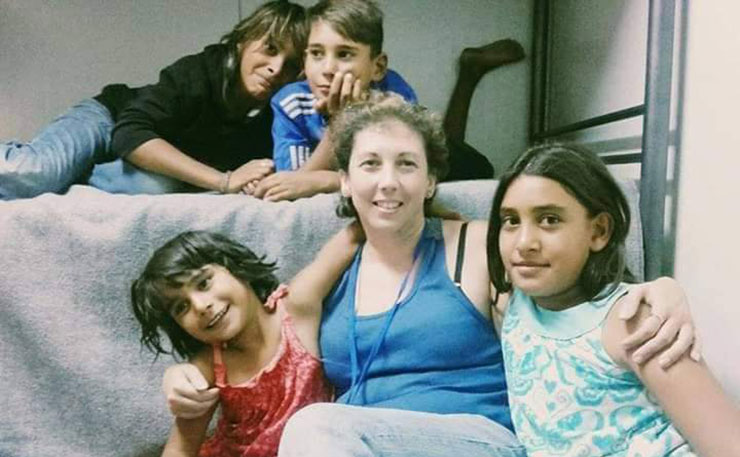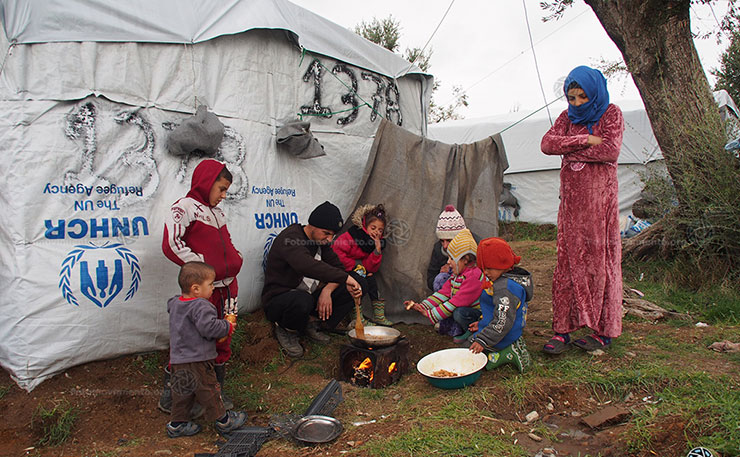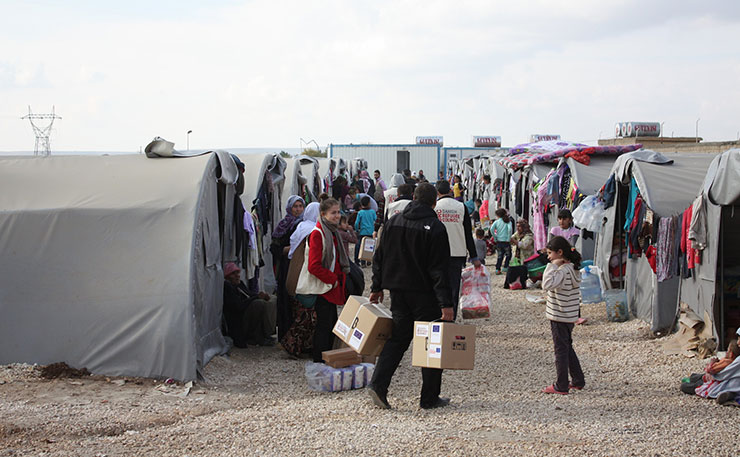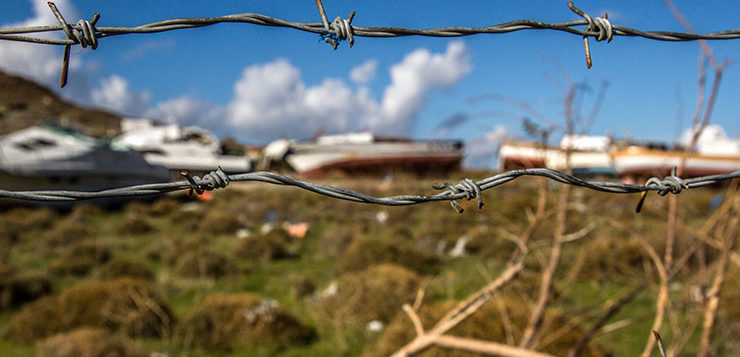DON’T MISS ANYTHING! ONE CLICK TO GET NEW MATILDA DELIVERED DIRECT TO YOUR INBOX, FREE!
It’s one of the world’s most renowned and idyllic locations. But the Greek Islands are also now home to tens of thousands of refugees. While their treatment by European agencies and authorities is almost certainly better than that dished out by Australia, it’s also been described as a ‘living hell’ by refugee experts. Australian journalist Gemma Clarke visited Vial refugee camp, and filed this special feature for New Matilda.
It’s 32 degrees on the Greek island of Chios and the queue for running water at Vial has snaked around the razor-wired compound.
“Today it is not hot, believe me – there are worse days,” says Jenny.
Jenny has lived her whole life on Chios, and is one of the last local volunteers assisting with the island’s burgeoning refugee crisis, which began in 2015.
Last month alone, 1367 people landed on Chios, mostly in rubber dinghies, putting the total number currently awaiting asylum in the Greek Aegean Islands at 32,537.
Two weeks ago, a boat bound for Chios carrying 19 people capsized outside Oinousses. Five women and two children drowned.
Anna is in the queue for water, nursing a fractured wrist that has not been properly reset, and is starting to fuse. She was injured during the journey from her home country of Afghanistan, and has been living in Vial for five months.
Anna doesn’t say why she fled.
“No-one asks their stories,” I am told by Leena, who is also originally from Afghanistan. “We don’t want to make each other relive anything.”

Being restricted to one hand makes it difficult for Anna to fill a bucket and wash her family’s clothes, but she keeps getting turned away by the in-camp doctor. Her case is not desperate enough.
Ahead of Anna, someone cuts the queue and an argument breaks out in the beating sun. Soon, two women are tearing at each other’s clothes. Camp authorities step in. After separating the pair, they shrug and turn to everyone waiting in line. “No more water until tomorrow.”
Just another day
With roughly 3,500 people crammed into Vial – a waste-processing plant turned Reception and Identification Centre intended to house about 1,000 – this is normal. There are not enough tents, there is not enough bedding, and there is definitely not enough water.
“A lot of the day here, the taps are off,” Jenny explains. “Water is on for three, maybe four hours, and there is only one shower for every 100 people.”
In 2016, pipes were laid to provide Vial with drinkable water, and according to the local water company, they are ready to be joined to the taps. Jenny, who has been heavily involved in trying to get them connected, says she can’t understand the delay.
“The pipe of drinkable water is ready outside Vial. I have spoken to UNHCR; they said they would mention it to Vial administration. No answer. I have spoken to Vial’s administration first reception. They said they have no idea.”
For years, camp management has been allocated EU funding to give everyone in the camp two bottles of drinking water each day, but for a long time, they were only providing refugees with one.
Now, all drinking and other water is being provided by organised groups run entirely by volunteers who fundraise using social media.
So where is all the EU funding going?
Sharon Silvey, the founder of RefuComm – an organisation that gives refugees vital information about their rights and asylum procedures – says the European Commission has been aware of the water situation for months.
“We told the Deputy Director General of the European Commission at our last meeting in April that this was happening, and he didn’t bat an eyelid,” she says.
Life in the camp
The day after the incident in the queue, I sit below an olive tree in a litter-strewn stretch of dirt behind the camp with Anna and some other members of Vial’s Afghan community. Among them is Leena, who translates the rapid Farsi to English, and 23-year-old single mother Asal.
Everyone asks if I can change their names for safety reasons.
Around us is the camp overflow: sagging tents and tarpaulins, mats for those sleeping rough, crumpled plastic bottles, empty microwave meal packets, dried human faeces and ribbons of used toilet paper. A dozen dogs sniff for food scraps, and a trio of children draw pictures on a strip of cardboard box with one of my pens.
I am approached by two men from Iran who mistake me for a lawyer. Legal advice is important if they want their asylum eligibility interviews to go well, but it’s extremely hard to obtain. In the two years they have already been waiting in Vial, the pair have learned Greek, eager to integrate into the local community as soon as they can.
“Are you a lawyer? Do you please have five minutes to talk?”
I turn them away, apologetically.
Anna tells me that inside the camp, she, her husband and their three children share a tiny shipping container with another family of seven, separated only by a sheet.
GOT SOMETHING FROM THIS? Then why not kick in a couple of bucks direct to the journalist who wrote this feature, and help her write many more. Click here to be part of the solution.
“It’s so hot, and the air conditioning doesn’t work, so we sleep outside on the concrete,” she says. Though it’s been warm all summer, winters in the Aegean Islands are freezing. Sometimes it even snows.
“In two weeks, all these people will be wet,” says Jenny. “And the children – all their clothes will be wet. In the summer, you can say it’s a little bit okay, but in the winter you cannot be here.”
In the middle of an otherwise bare noticeboard is a flyer dated several months back declaring that Médecins Sans Frontières doctors will no longer be in attendance at Vial. Instead, for two hours each day, there is one doctor from the army.
“Always, they turn me away,” Anna says, gesturing at her injured wrist. “They tell me I can’t get vaccinations for my children for months, which means they are not allowed to go to school.”
Recently, the doctor told a heavily pregnant woman bleeding from her vagina that she should “come back tomorrow”.
“What happened to her?” I ask.
“She lost her child.”
Asal has been living in a leaking, unpowered tent with her 11-month-old daughter since July. Her voice is croaky from a two-week throat infection for which she has been unable to get medicine for.
“Having a baby in here, it’s so hard,” she says. “Sometimes when there is water, you get into the shower and put on soap and shampoo, then it turns off before you can even wash.”
When I ask what the camp is like after dark, the women exchange glances.
“In the night, it is not safe here,” Anna says finally, smoothing her skirt. “The walk to the toilet is so long, past tents with men of all different nationalities.”
Asal bobs her daughter on her lap, holding back tears.
“I have asked to be moved out of the camp, because I have a baby and no longer have a husband,” she says, “but they told me I was not vulnerable.”
‘Special’ treatment
Pursuant to Greek law, certain people are considered vulnerable – unaccompanied children; the elderly; people with disabilities, incurable illnesses or PTSD; victims of torture, rape or human trafficking; pregnant women or those who have recently given birth; and single parents like Asal who have young children.
Vulnerable people are afforded special procedural guarantees and can be moved out of the camp and into safer alternate accommodation while they await accelerated processing. In practice, however, this does not happen as often as it should. Nearly 100 unaccompanied minors are living in Vial, sleeping in containers with peeling flowers painted on the side and an extra coil of barbed wire to protect them.
In February last year, the UN released a statement emphasising the heightened risk of sexual violence women and children face as a result of overcrowding and tensions at reception facilities in Greece.

Unsurprisingly – with more than triple the intended inhabitants and limited safeguards in place to protect them – in Vial, rape and sexual assault is a fact of life.
“Almost all goes unreported,” Jenny tells me. “[There is] the fear to go to the police and tell that, but there are also the problems you have from your own community.”
Leena and her family were finally classified as vulnerable when her husband and daughter’s health plummeted to new lows in Vial. Several months ago, they were moved out of the camp and into local housing.
“It was such a relief,” she tells me. “Big rats run around the rooms at night. We were terrified.”
For more than a year, Leena has been waiting to find out if her family’s claim for asylum will be granted.
“Everyone in Vial is depressed,” she says. “There are so many mental health issues. The stress of waiting is so much. Another family with us on the boat got their decision today and they were denied [refugee status]. The father and the son’s stories were a little different… it happens, there are never enough translators, so sometimes there are mistakes. To have waited all this time in limbo, only to be told no….”
Before she was a refugee, Leena was working a well-paid government job in Kabul. One day, a letter was pushed under the front door of her family home.
“They said that they would kill me and kidnap my children,” she says. “Women in Afghanistan don’t often drive, but because my husband is sick, I took myself to work. Maybe sometimes my hijab wasn’t on properly in the car. Maybe the Taliban saw, and they think I am not a good Muslim, that I work for Americans.”
I ask if it is common practice for people in positions like Leena’s to receive letters in the mail.
“Sometimes there is no letter. You just disappear,” she says.
As well as death threats, women like Leena often flee Afghanistan due to forced marriages, domestic violence, sexual violence and the country’s 40-year war.
The day after she received the letter, Leena kept her children home from school and did not go to work. She applied for tourist visas to Turkey, telling no-one, and bundled her family onto a plane as soon as they were granted.
The refugee reality
Turkey currently hosts the world’s largest population of refugees, among them 3.6 million Syrians and an increasing number of Afghans. Amnesty International holds that Turkey is manifestly not a safe country, nor is it on the brink of becoming one – especially for refugees.
Reports of harassment, violence and even death are rife and many people have been forcibly returned to their home countries.

Despite this, the EU-Turkey deal – which came into effect in March 2016 – still stands. According to this agreement, anyone arriving to the Greek Islands by boat or without official permission or passage is to be returned to Turkey.
Though in effect this law has been invoked relatively infrequently – less than 3,000 people have been deported at the time of writing – Greece’s newly elected right-wing government has promised to strengthen Greece’s anti-refugee policies and even abolish the right for rejected applicants to appeal, in blatant disregard of the country’s international legal obligations.
When Leena got to Turkey, she found everyone in her neighbourhood “racist and unaccepting”. As non-Europeans, she and her family were ineligible as refugees, and could only access a type of protected status allowing them to live with very few rights for six months. After half a year of working overtime unpaid in a Turkish sweatshop amidst brutal conditions, Leena’s family’s application for a second identity card was taking longer than usual to process.
“We had no choice. We left again,” she says.
Leena wanted to get her family to Italy, and after spending her life savings on the passage, was told to bring enough food and water on the ferry to last six days. Just 16 hours into the journey, they landed in Greece.
“The boat was having difficulties with the way it pumped water, and they said we would sink otherwise. We were so full of terror. I still can’t believe we did it,” she says.
Our conversation is interrupted by a note of music. I gaze to our left, where a handful of people from the camp are sitting straight-backed on a circle of tatty mats. A phone plays a meditation track and together, they breathe in and out, fingers pinched on folded knees. They’re meditating.
I ask the women if they knew the situation in Greece was going to be this bad.
“No,” Anna laughs emptily. “This is Europe. We thought there would be help for us here.”
“If the camp wasn’t bad,” adds Asal, “waiting for processing wouldn’t be that bad, but the camp is – well, you can see.”
She’s not wrong. Vial is unsafe, unsanitary and unliveable. I am told the provided microwave meals are “okay” and “sometimes warm”, but am also shown a photo of a serving swarming with maggots.
Various organisations on Chios have described Vial as a “living hell”, and earlier this month, Médecins Sans Frontières accused Greek and European authorities of deliberate neglect. Many suspect that it’s intentional, that the European Commission is purposely trying to make Reception and Identification Centres like Vial hostile and unbearable to deter people from attempting to land there in pursuit of safety.
But with hundreds of thousands of refugees in Turkish ports waiting to cross the Aegean Sea; with boats continuing to arrive in Greece unabated; and with conflict, extreme poverty and human rights violations in several Asian and African countries showing no signs of dissipating, the horrific conditions in the camps are often still preferable to the ones people are fleeing.
“What are your hopes for the future?” I ask the women.
Anna tells me two of her children got separated when they moved overland through Iran and Turkey. She has no idea if they made it to a camp on another island, or what might have happened.
“When I get out, I want to go to the other camp [to look for them], or back to Iran or Turkey.”
Jenny says she wants the water connected, and for all unaccompanied children to be moved out of Vial.
“What was your life like before 2015?” I ask, referring to when the first boat landed on a beach in Chios.
“I don’t remember,” she replied. “My life started in 2015.”
GOT SOMETHING FROM THIS? Then why not kick in a couple of bucks direct to the journalist who wrote this feature, and help her write many more. Click here to be part of the solution.
Donate To New Matilda
New Matilda is a small, independent media outlet. We survive through reader contributions, and never losing a lawsuit. If you got something from this article, giving something back helps us to continue speaking truth to power. Every little bit counts.




